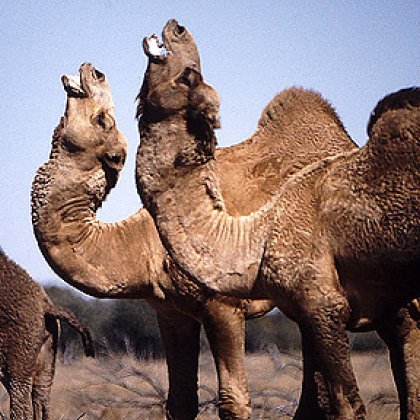
UQ research has found when it comes to camels, staying cool may be the key to reproductive success.
Emeritus Professor Gordon Grigg, from UQ’s School of Biological Sciences, and a team of colleagues working in Central Australia, have found male camels have the ability to drop their body temperature which may help them last longer in rutting displays.
“Rutting involves very energetic daily display “fighting” during which bulls contest ownership of a herd of females,” Professor Grigg said.
“By starting each day cooler, a bull can postpone heat stress, compete for longer, win more contests and potentially sire more offspring.”
He said the ability of camels to drop body temperature in the mornings, invoking hypothermia, was once thought to be only a mechanism for conserving water in very hot dry conditions.
“But what we saw cannot be for saving water, we saw it only in winter, only in bulls during rut and, anyway, they had water freely available and used it routinely,” he said.
“So we speculate that by lowering their minimum temperature each morning during rut, bulls increase their chance of winning a harem.
“By starting the day cool, a bull will enhance his capacity to store heat generated by the strenuous activity, thus prolonging the onset of heat stress.
“A bull that can sustain a contest for longer is more likely to win it and, so, control a herd of females and get more matings.
“That is, the daily hypothermias we observed could have a direct bearing on reproductive success. “
Professor Grigg said the rutting habits of male camels were fascinating as competing bulls perform elaborate, ritualized and intense competitive behaviour including posing and strutting side by side, inflating and exposing the dulaa (a sac-like extension of the palate), jostling, exhibiting flehmen (curling the upper lip to enhance chemoreception), running together and, not always but often, actually fighting.
The study by Professor Grigg and his team Jürgen Heuke and Birgit Dörges (camel behaviourists & ecologists, University of Braunschweig), Jocelyn Coventry (veterinarian, Alice Springs), Alex Coppock (cattleman, Newhaven) and, from the School of Biological Sciences, Lyn Beard (Scientific Officer) and Simon Blomberg (statistical assistance), has been published online in scientific journal Biology Letters (doi:10.1098).
Media: Gordon Grigg (3374 1737) or Andrew Dunne at UQ Communications (3365 2802 or 0433 364 181).


